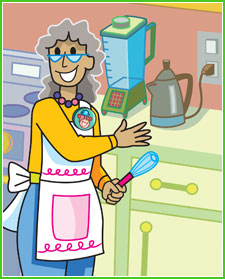|
|
Sponsored Content



THE POWER SAFETY TEAM VISITS GRANDMA
Grades K-2
[Lexile 500L]
Grades K-2
[Lexile 500L]
In this activity, students will learn the importance of gas and electric safety.
Materials needed: Mini-storybooks, crayons, and markers
- Start by asking students the following questions:
- What happens when your mom or dad turns on the stove? (It gets hot; flames appear with gas stoves; coils change color and get hot with electric stoves.)
- What makes the stove get hot or makes the flames appear? (Natural gas or electricity—these are sources of energy.)
- How do we use gas in our homes? (We use gas for energy. Gas can be used to power heaters, stoves, ovens, washing machines, dryers, and other appliances in our homes.)
- What is electricity used for? (Answers might include TVs, refrigerators, lights, dishwashers, microwaves, coffeemakers, toasters, computers, elevators, etc.)
- Why is it important for kids to stay away from stoves, ovens, heaters, and appliances that use gas? Why should you never play with gas and electricity? (They can cause burns, fires, or shocks. Only grown-ups should touch these appliances.)
- How can we save energy? (Example: Turn off appliances and lights when we are not using them.)
- Why is it important to save energy and not waste it? (It helps the planet. And it can help save money.)
- Distribute copies of the mini-storybook and ask students to follow along as you read aloud. Emphasize to students the importance of gas safety. Explain:
- Natural gas leaks smell like rotten eggs.
- If you smell gas, tell a grown-up you know right away. The grown-up should get everyone away from the area.
- Do not turn lights on or off or turn any appliances or electronics on or off—including phones, tablets, and cell phones. Never light matches.
- After everyone leaves the building or area, the grown-up should call the gas company or 911 to report the possible leak.
- Remind students: “Smell gas. Act fast.” Tell a grown-up you know.
- Have students complete the activity on the last page and color “The Power Safety Team Member” badge. Once done, students should take the mini-storybooks home to read with their parents. We also encourage you to include copies of the parent letter with safety tips found in the Family Resources section to help inform parents about these important messages.
Teachers, learn more about gas safety at coned.com/customercentral/gassafety.asp.
(Note: This site is for adults only.)

